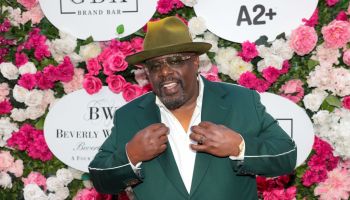Until we change the rules on how – and why – police can approach Black Americans and those in “high-crime areas,” the duality of civil rights protections will remain skewed based on demographics, not citizenship
As the statistics continue to display, roughly once a day, there is an African-American in this nation – our homeland – that falls at the hands of police or an “authority figure” under violent circumstances, with the rate of death being over 20 times more than other Americans.
This week, it’s Freddie Gray of Baltimore. Just a few weeks ago, it was the late Walter Scott of South Carolina. Previously, it was Jonathan Farrell in Charlotte, Anthony Hill in Atlanta, or Michael Brown.
Frustratingly, we could go on with names that are known across the nation as well as with the silent tears of family members whose losses surprisingly are not counted officially and uniformly by police forces throughout the nation.
Many police leaders and elected officials continue to advance the narrative that these tragedies are occurring primarily due to a “lack of training” or need to “promote community policing efforts”. Despite these valid yet periphery explanations and suggestions,an inconvenient truth is overlooked, one that many police officers and millions of Americans seemingly sidestep: police forces around the nation cannot continue the quasi-constitutional practice of stop-and-frisk, as it provides gateways of opportunity for the history of mistrust and misconduct between police forces across the nation and “urban communities” (e.g., Black communities) to permeate with its deadly scourge of tragedies.
Despite the clear evidence that there is a high level of mistrust and dysfunction between Blacks and police, the tone remains constant, whether it come from Baltimore’s Fraternal Order of Police’s claim that the images of protests “…look and sound much like a lynch mob…” or that police officers are under “…constant attack…” under the critique of being called “racists” whenever incidents of questionable police conduct comes to light. That tone – that police are justified in their actions (way of grand jury decisions, public perceptions, some in the media, and public relations operatives) remains the same because several spoken and unspoken realities continue to direct the narrative.
Spoken: “We all agree that the vast majority of police officers are good, hard-working servants of the community.”
Unspoken: These incidents involving police-initiated assaults and deaths are rare, despite the statistics we’re seeing today and the daunting history of police-community tensions and abuses throughout America. The protests of Black communities are nothing more than urban legends drummed up by a blood-thirsty media frenzy. Thus, we should not “focus” on this disturbing reality.
Spoken: “These victims were known to live in or frequent high-crime areas.”
Unspoken: These men and women – afforded the right to “innocent until proven guilty” and the protections of the Constitution (including the 4th Amendment concerning illegal search and seizure) in each and every encounter with police – were miscreants involved in seedy behavior and, thus, committed some act of their own during the interaction with police that resulted in their untimely demise. Due to their lifestyles, this was bound to happen one way or another.
Spoken: “…if you are in a high-crime area, and you flee from the police unprovoked, the police have the legal ability to pursue you...in this type of an incident, you do not need probable cause to arrest…you just need a reasonable suspicion to make the stop.”
Unspoken: If you’re Black, male, and young in America – at a time when 1.5 million Black men are “missing in America” in large part due to the widening incarceration rates between Black citizens and White citizens in our nation – just a random thought by a police officer that one might be “up to something” is enough for engagement and possible arrest. Couple this with the disturbing views that many Americans – including many African-Americans and police officers – have towards Black boys as young as 10 – it is clear that the flimsy phrases “reasonable suspicion” and “probable cause” in today’s America can have devastating results. Increasingly, innocence means nothing in the shadows of perceived guilt.
That is why the unspoken reality must be pressed into the national conversation:
We will continue to have these tragic incidents until the rights of African-Americans as American citizens are reinvigorated during police engagements with the community.
Although these matters should ideally be presented and implemented at the local and state levels of government, the revamped congressional proposal by Reps. John Conyers (D-MI) and Ben Cardin (D-MD) to address the racial profiling that plays a role in many of these police tragedies – on its surface – seems sounds.
We must have a resurgence of civil rights protections for the underclass when engaging the police, even if they have had previous criminal offenses.
We can and must promote safety for all while enforcing the legal protections we have as private citizens, public servants, and individuals afforded due process consistent with their crimes.
We must have a better picture of the number of violent incidents occurring between police and those they engage in order to truly bring these issues from the realm of urban legend, video footage from cell phones, and blurred lines of facts and perceptions. Lives on both sides of the badge are on the line.
We must have a clearer pathway to justice for all victims in these situations – from police officers that are falsely accused of misconduct to folks that find the halls of justice too infrequent and with much delay. The lack of proper reporting of these incidents – including ones that could end up being crimes – is unfathomable and inexcusable in our nation.
We must end a practice that leads to a de facto “reasonable suspicion” of an entire demographic of future benefactors of American society and the global economy. Without doing so, we simply prop open the door to the ongoing unrest that we see spilling out in the streets of Baltimore today, North Charleston last week, and Ferguson last year.
If you want to end the questionable string of deaths at the hands of police, we must end the current accepted and applied practice of stop-and-frisk.
Lenny McAllister is a political analyst and commentator that hosts and produces NightTalk: Get to the Point on the Pittsburgh Cable News Channel Friday nights at 8pm and hosts “The Lenny McAllister Show” each Saturday at 2pm ET on Newsradio 1020 KDKA in Pittsburgh. He is also featured on various local, national and international outlets including the Canadian Broadcasting Corporation, Al Jazeera America, CNN, the American Urban Radio Network, and Sun News Network. You can follow Lenny on Twitter and Facebook.
PHOTO CREDIT: Getty

















